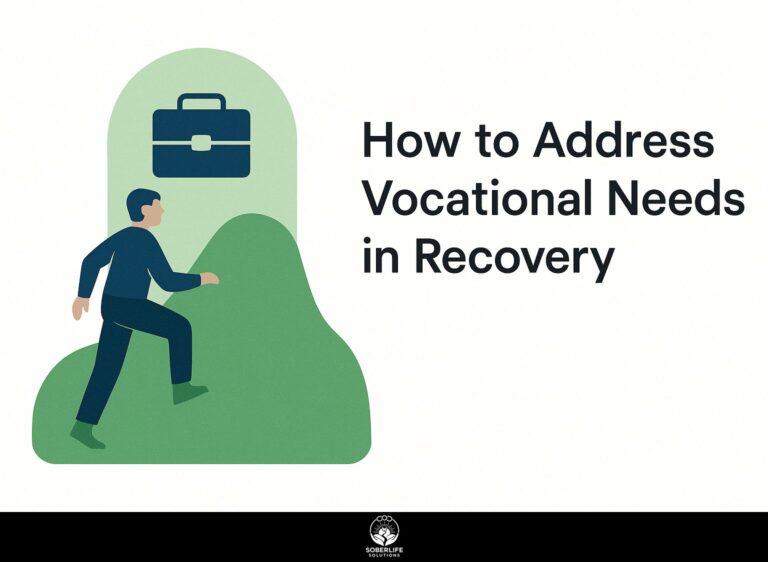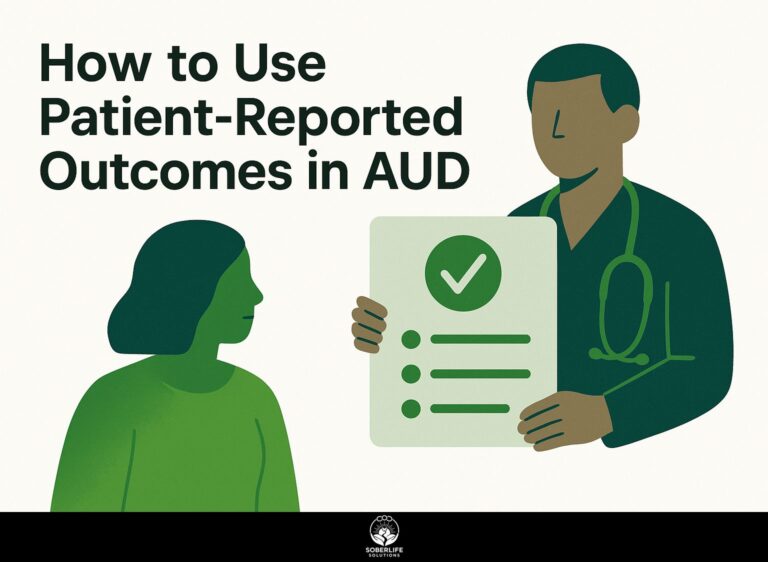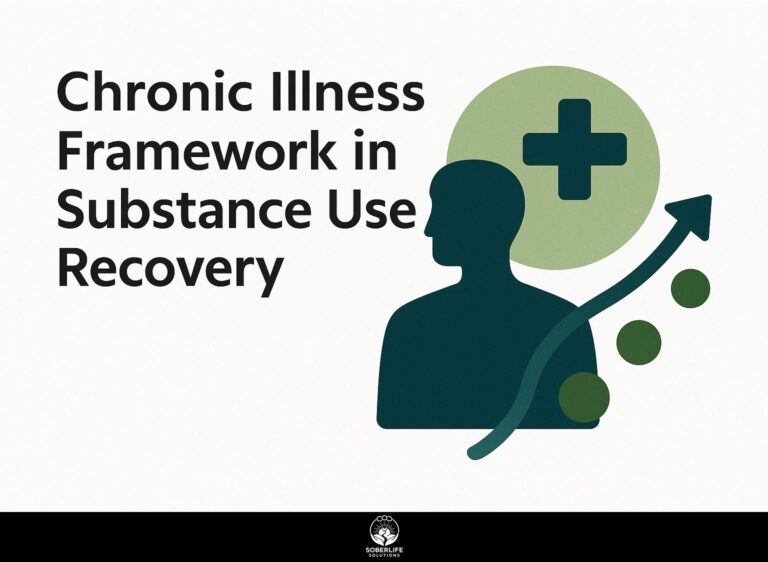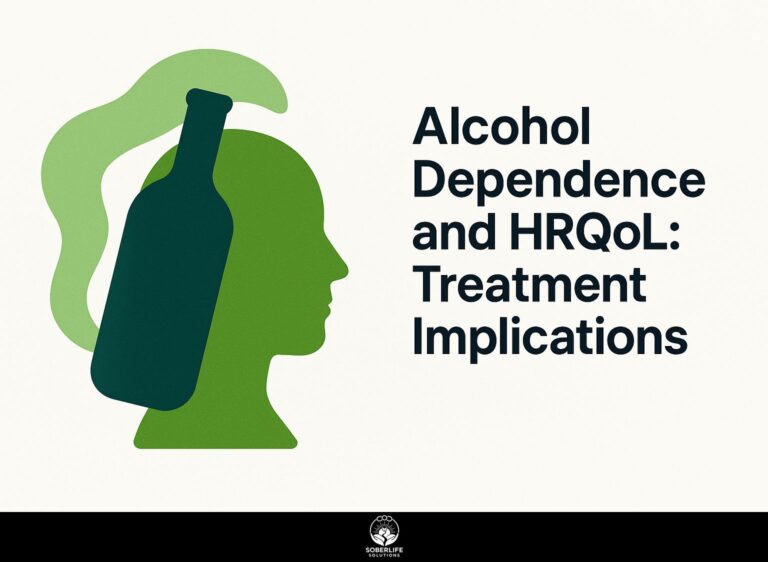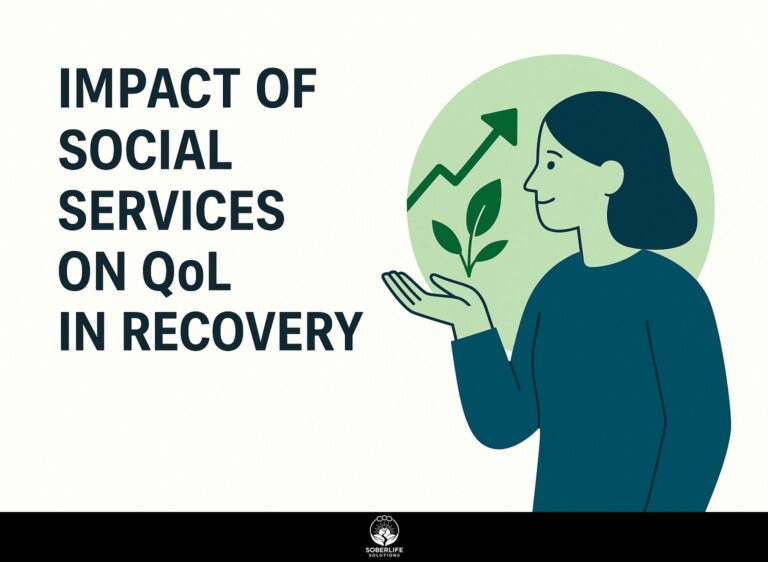How to Enhance Recovery and Vigor in AUD Treatment
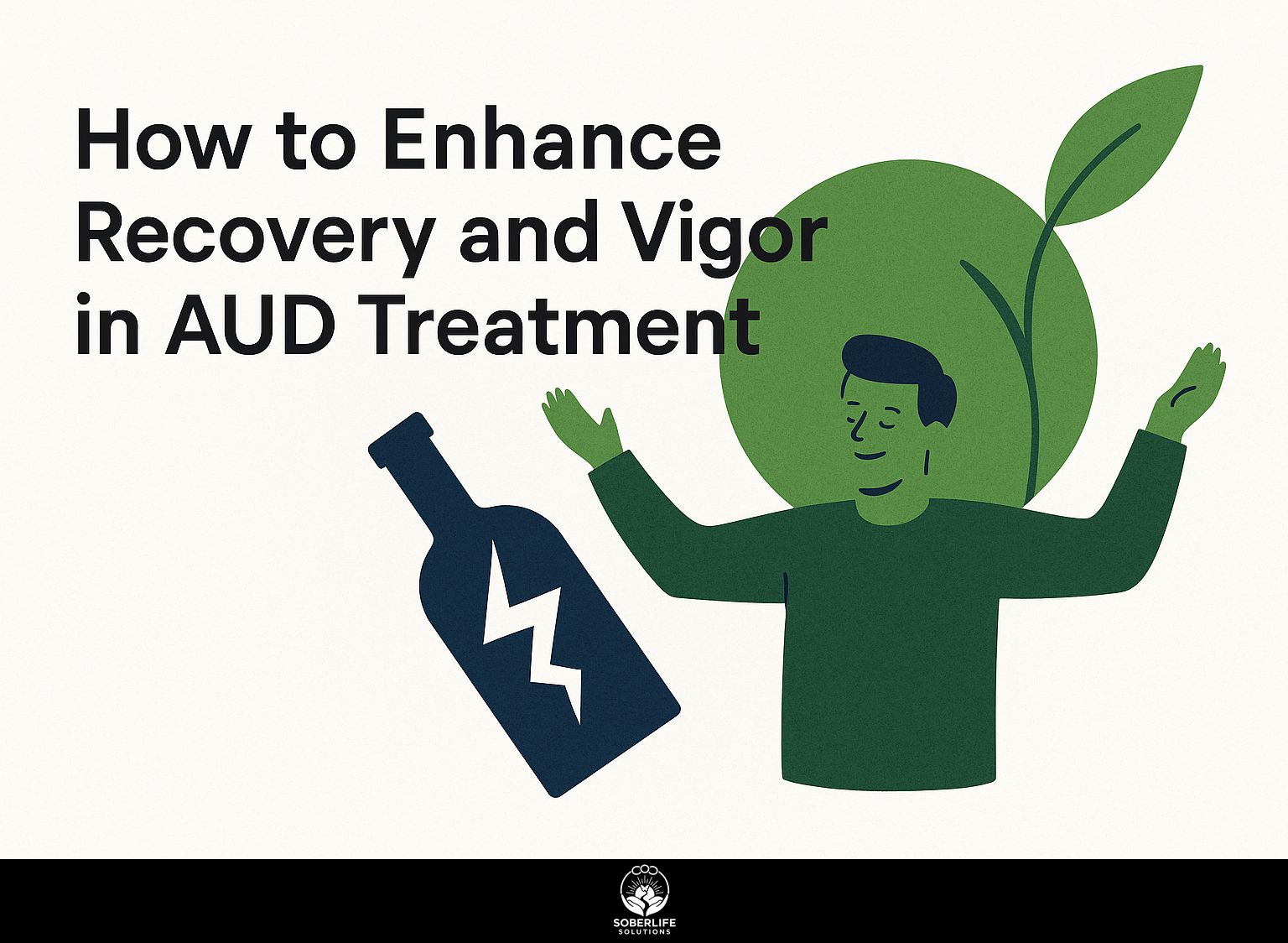
Struggling with alcohol use disorder (AUD) can significantly impact your quality of life, but recovery is within reach. By improving recovery and energy, you can develop a positive mood and regain your health. This article looks at practical methods and thorough ways to help you handle problems and improve your health. Learn how to change your life and succeed despite AUD.
Key Takeaways:
Alcohol Use Disorder (AUD) Explained
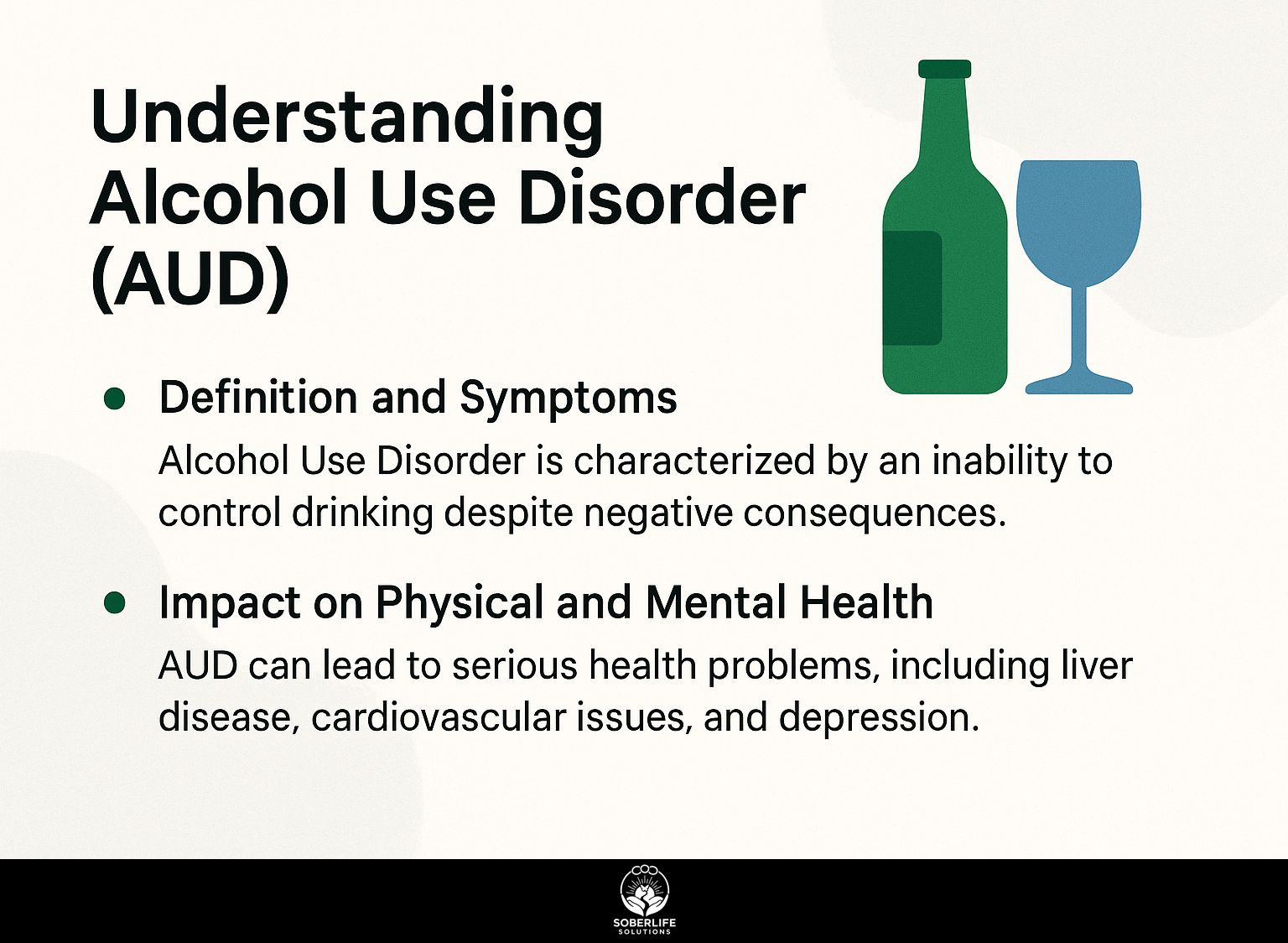
Alcohol Use Disorder (AUD) impacts a large number of people and includes signs that can interfere with everyday routines and health. According to the Mayo Clinic, symptoms of AUD can range from mild to severe and include problems with controlling alcohol intake, continued use despite negative consequences, and a strong craving for alcohol. To further understand how these symptoms can be managed, exploring mindfulness-based interventions for AUD can offer valuable insights and implications for treatment.
Definition and Symptoms
AUD is defined by an inability to control alcohol use, with symptoms including cravings, withdrawal, and neglect of responsibilities.
Key symptoms of Alcohol Use Disorder (AUD) include a strong desire to consume alcohol, increased tolerance (needing more to achieve the same effect), and experiencing withdrawal symptoms like anxiety or tremors when not drinking.
Neglecting responsibilities, such as work or home duties, is also notable. A useful tool for assessment is the Alcohol Use Disorders Identification Test (AUDIT), which consists of ten questions to help individuals gauge their drinking patterns and associated risks.
Checking in with yourself regularly can help you know when to ask for support.
Impact on Physical and Mental Health
The impact of AUD extends beyond the individual, affecting both physical health and psychological well-being, leading to a significant decline in quality of life.
Consuming excessive alcohol can cause ongoing health problems like damage to the liver and cardiovascular disease. For instance, studies show individuals with AUD have a 50% increased risk of depression and are more susceptible to developing cardiovascular conditions due to high blood pressure from excessive drinking.
According to a 2020 study published in the Journal of Clinical Psychiatry, patients with AUD reported a diminished quality of life, rating their well-being 30% lower than their non-AUD counterparts. Addressing AUD through counseling and support groups can significantly improve health outcomes. As emphasized by the Mayo Clinic, understanding the symptoms and causes of alcohol use disorder is crucial for effective treatment.
Importance of Recovery and Vigor
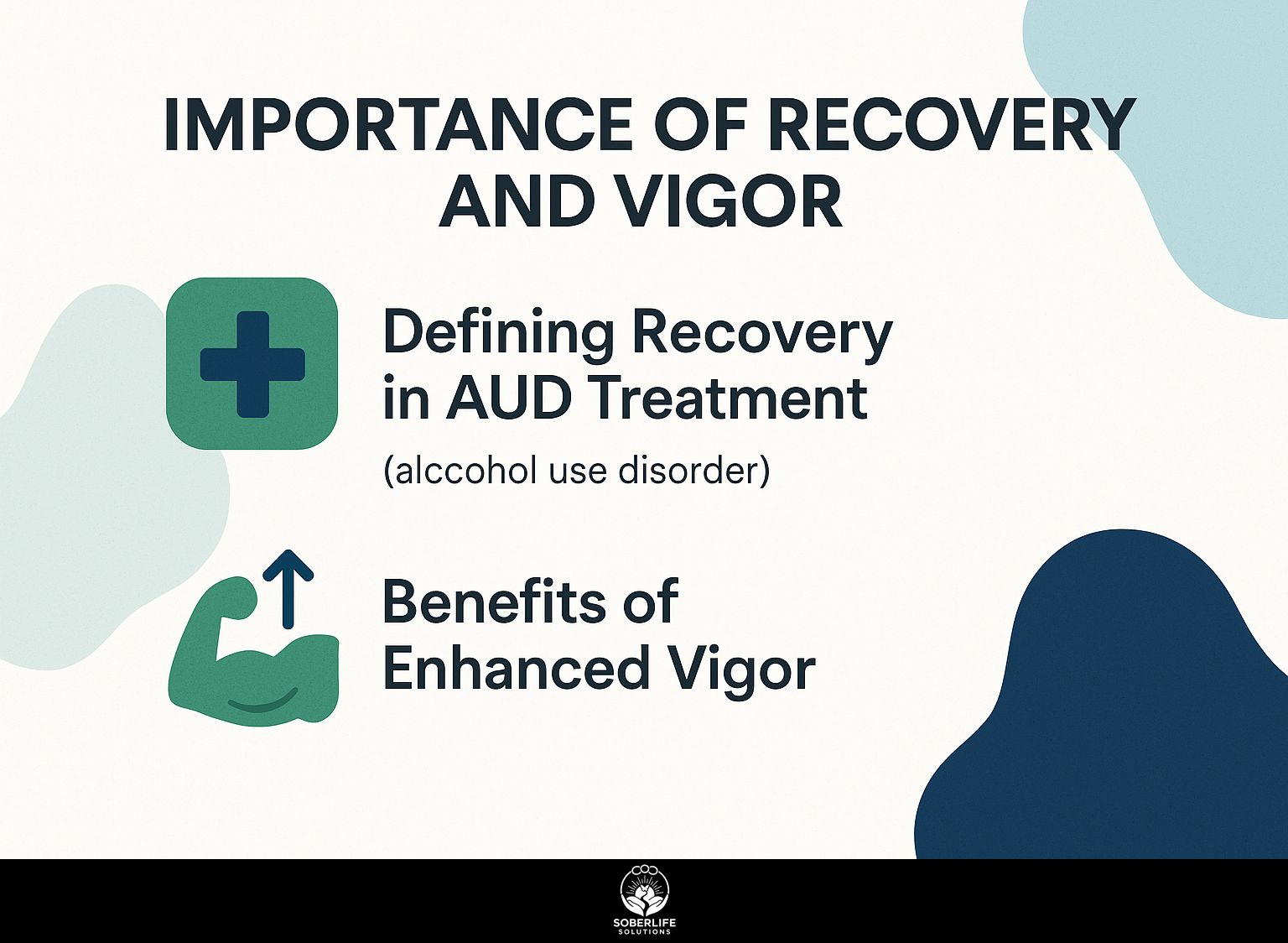
Recognizing the importance of recovery is essential for those facing AUD, as it lays the foundation for a healthier, more active life. For those interested in exploring effective methods, consider a deep dive into recovery techniques like mindfulness and meditation, which are instrumental in stress reduction and promoting well-being.
Defining Recovery in AUD Treatment
Recovering from AUD involves more than stopping alcohol use; it also means focusing on your health and overall well-being.
Important parts of getting better include changing behaviors, which might mean using cognitive-behavioral therapy (CBT) to focus on basic thought patterns, and doing healthy things like exercising to improve mood and strength.
Often, health gets better with improved sleep, better focus, and fewer alcohol-related physical health problems.
Support systems are important; joining group therapy or support groups like Alcoholics Anonymous can offer essential encouragement and accountability.
As stated by the WHOQOL Group, these joint actions greatly improve people’s quality of life while they recover. For expanded context, the World Health Organization highlights the significance of comprehensive rehabilitation in enhancing recovery outcomes.
Benefits of Enhanced Vigor
Feeling more energetic during recovery improves mood and helps build strength to avoid falling back into old habits, leading to continuous positive progress.
Regular physical activity is important for increasing energy. Engaging in exercises such as walking, yoga, or strength training can significantly improve mental well-being.
Studies show that participants who exercised reported a 30% decrease in relapse rates compared to those who remained sedentary.
Tools like MyFitnessPal or Fitbit can help track your activity levels, further motivating you to stay consistent.
Aim for at least 150 minutes of moderate aerobic activity weekly to see substantial benefits in both mood and overall recovery.
Holistic Approaches to Recovery
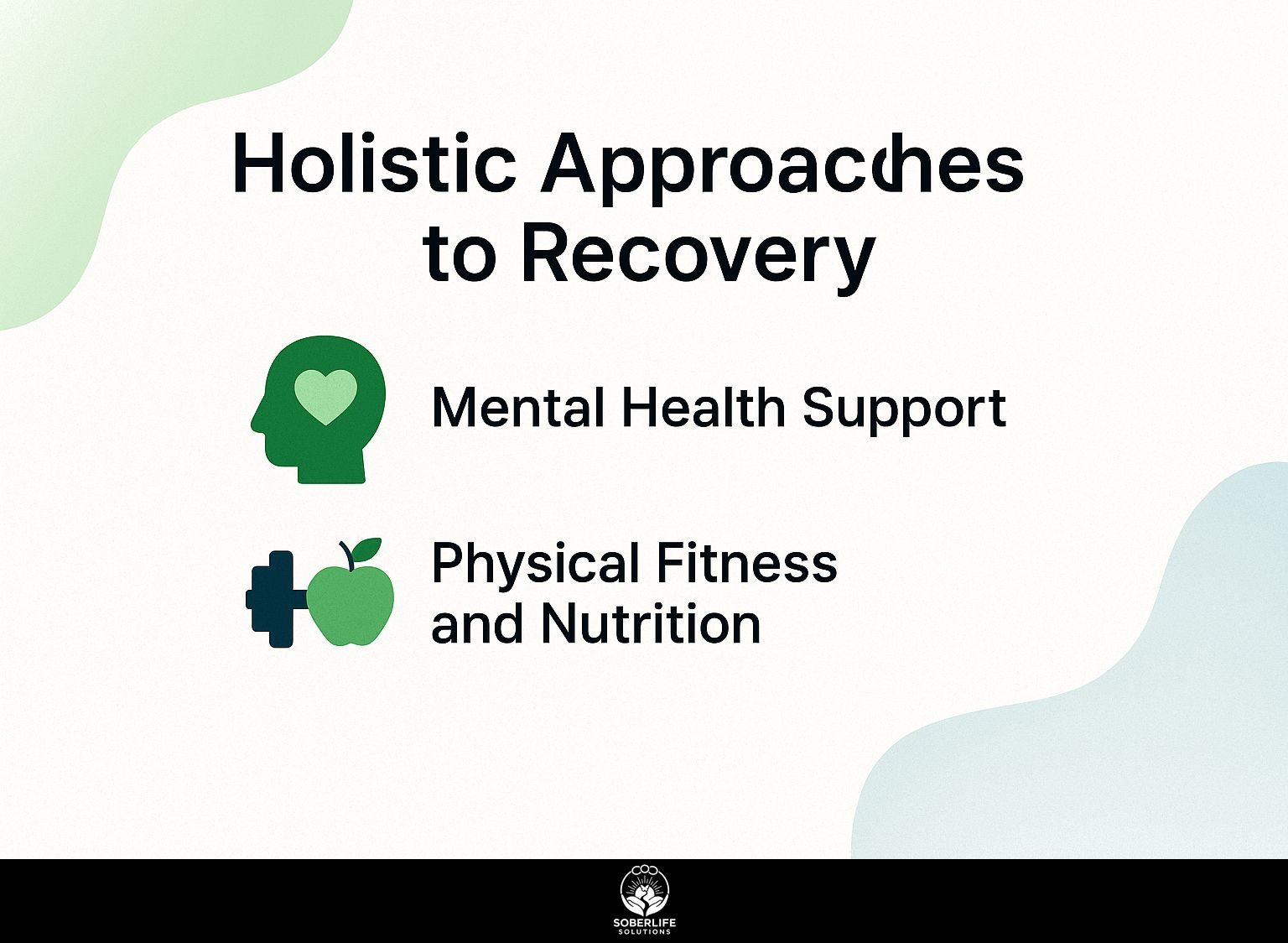
A complete method to recovering from AUD focuses on combining mental, physical, and social health for long-lasting recovery. For those interested in understanding the foundational steps, exploring the role of detox services can be crucial. Related insight: Detox Services: Types, Effectiveness, and Patient Outcomes
Mental Health Support
Mental health support is critical in AUD recovery, as psychological interventions can significantly reduce the risk of relapse.
Effective interventions include Cognitive Behavioral Therapy (CBT), which focuses on identifying and changing negative thought patterns.
Programs like Alcoholics Anonymous (AA) provide community support while integrating strategies to promote accountability.
Resources such as Mental Health America offer tools to locate local counseling services.
Practicing mindfulness activities, such as meditation or yoga, can improve emotional control.
Mixing therapy methods with support from peers and personal care techniques helps people build strength and manage their recovery better.
Physical Fitness and Nutrition
Including exercise and healthy eating in recovery plans can improve health and help the body heal.
Regular exercise, such as yoga, can help improve mood regulation among individuals with Alcohol Use Disorder (AUD). For example, a study published in the Journal of Substance Abuse Treatment found that participants who engaged in physical activities reported lower levels of anxiety and depression.
Eating a balanced diet that includes omega-3 fatty acids, whole grains, and lean proteins supports healthy brain function. Meal planning apps like MyFitnessPal can help track nutrient intake, ensuring that you fuel your body effectively during recovery.
Behavioral Therapies
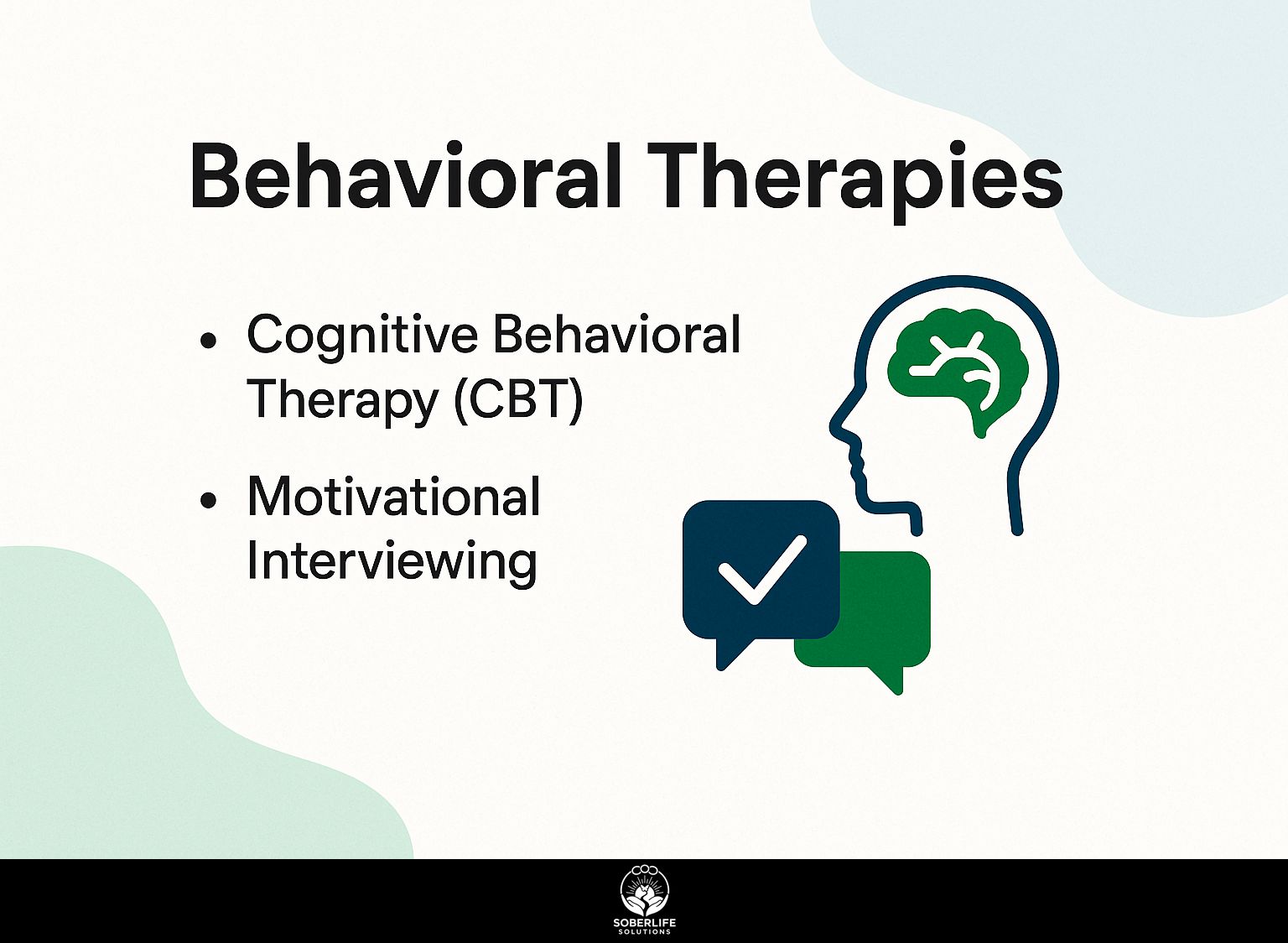
Behavioral therapies are important in treating AUD, using methods that address the actions leading to addiction. For those interested in the various strategies and benefits, our comprehensive overview of behavioral therapy approaches provides valuable insights.
Cognitive Behavioral Therapy (CBT)
Cognitive Behavioral Therapy (CBT) is a structured, goal-oriented approach shown to effectively reduce alcohol consumption in AUD patients.
Typically, CBT for alcohol use disorder comprises 8-12 sessions lasting 60-90 minutes each. Sessions include techniques like cognitive restructuring to identify and challenge negative thought patterns, and behavioral activation to encourage healthier activities.
For example, participants can use apps like the Drink Tracker to monitor their drinking habits and become more aware of them. Research shows that people who participate in CBT can lower their binge drinking by as much as 40%, showing how useful it is for creating lasting change.
Motivational Interviewing
Motivational Interviewing is a way of talking with patients that supports their willingness to change how they use alcohol.
This approach emphasizes empathy, active listening, and non-confrontational communication. Key techniques include reflective listening, where the practitioner repeats back the patient’s feelings to build a sense of connection, and open-ended questions that encourage conversation about their motivations.
Studies show that Motivational Interviewing can lead to a 30% improvement in treatment adherence. Integrating brief assessments can identify ambivalence towards change, further guiding the conversation.
Using these methods well creates a supportive setting that encourages people to look into why they want to change.
Support Systems
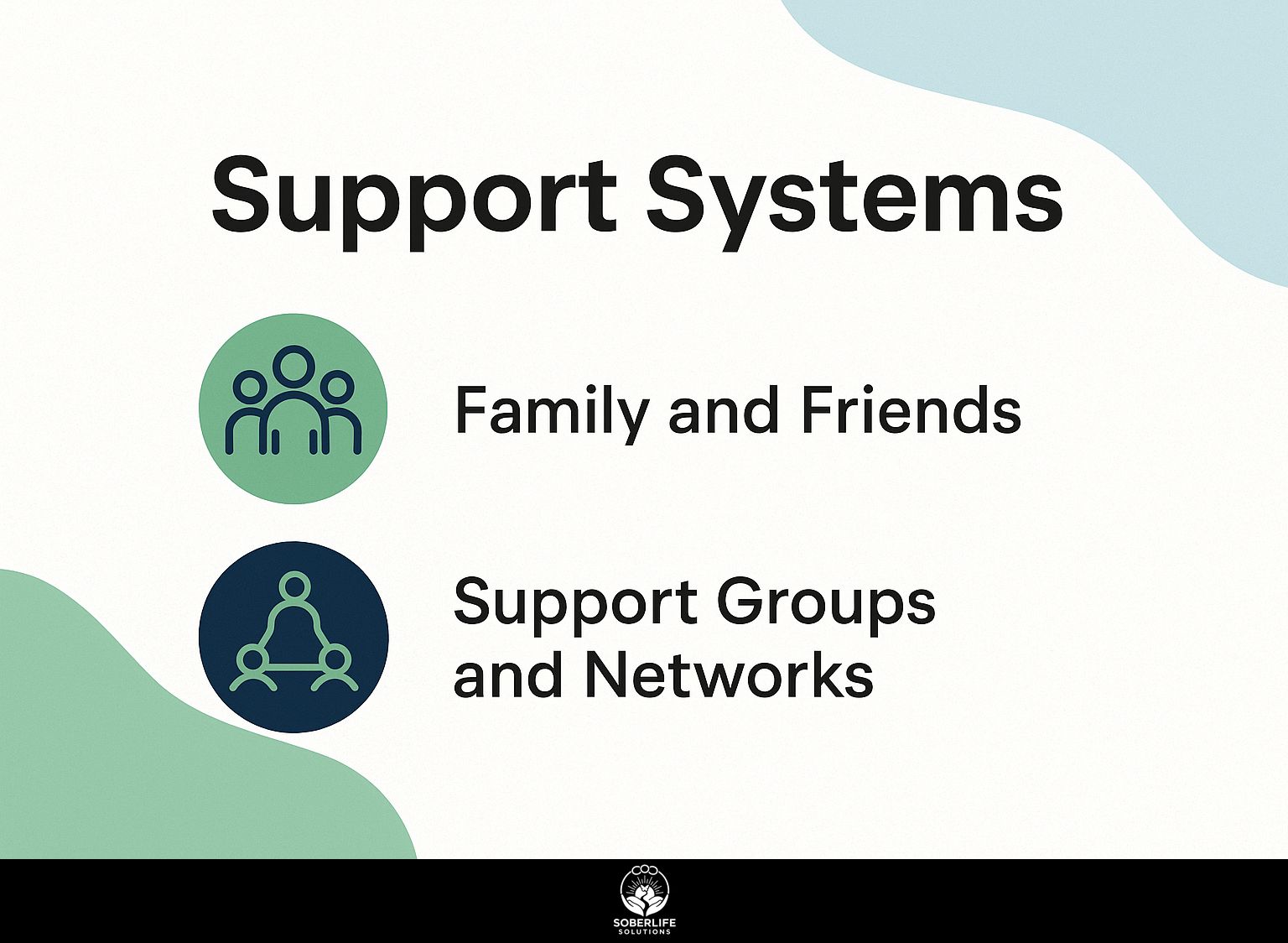
Support systems like family, friends, and community groups play an essential role in recovering from AUD, creating a network of support. For those interested in the specific ways these sober support systems can facilitate recovery, one can explore how they effectively contribute to the recovery journey.
Family and Friends
Involvement of family and friends can provide essential emotional support and accountability for individuals in recovery from AUD.
To build this support, open communication is essential. Family members can engage in active listening, ensuring the individual feels heard and understood.
Educational resources like Al-Anon can educate loved ones about the recovery process and coping strategies. Programs like family therapy or support groups made for families of people with AUD have shown to be helpful.
For example, participating in a Family Recovery workshop encourages shared experiences and builds a solid support network, contributing to more successful recovery outcomes.
Support Groups and Networks
Support groups like Alcoholics Anonymous (AA) offer peer support and shared experiences, which are instrumental in the recovery process.
Being part of support groups can greatly improve your recovery by giving you responsibility and a feeling of belonging. Groups like SMART Recovery support people in managing their lives by offering meetings and online forums where members exchange tips on handling cravings.
Support groups build relationships that can develop into lasting friendships with people who know your challenges. Participating regularly helps people stay committed to their recovery goals, allowing them to face challenges with others instead of alone.
Monitoring Progress and Adjusting Treatment
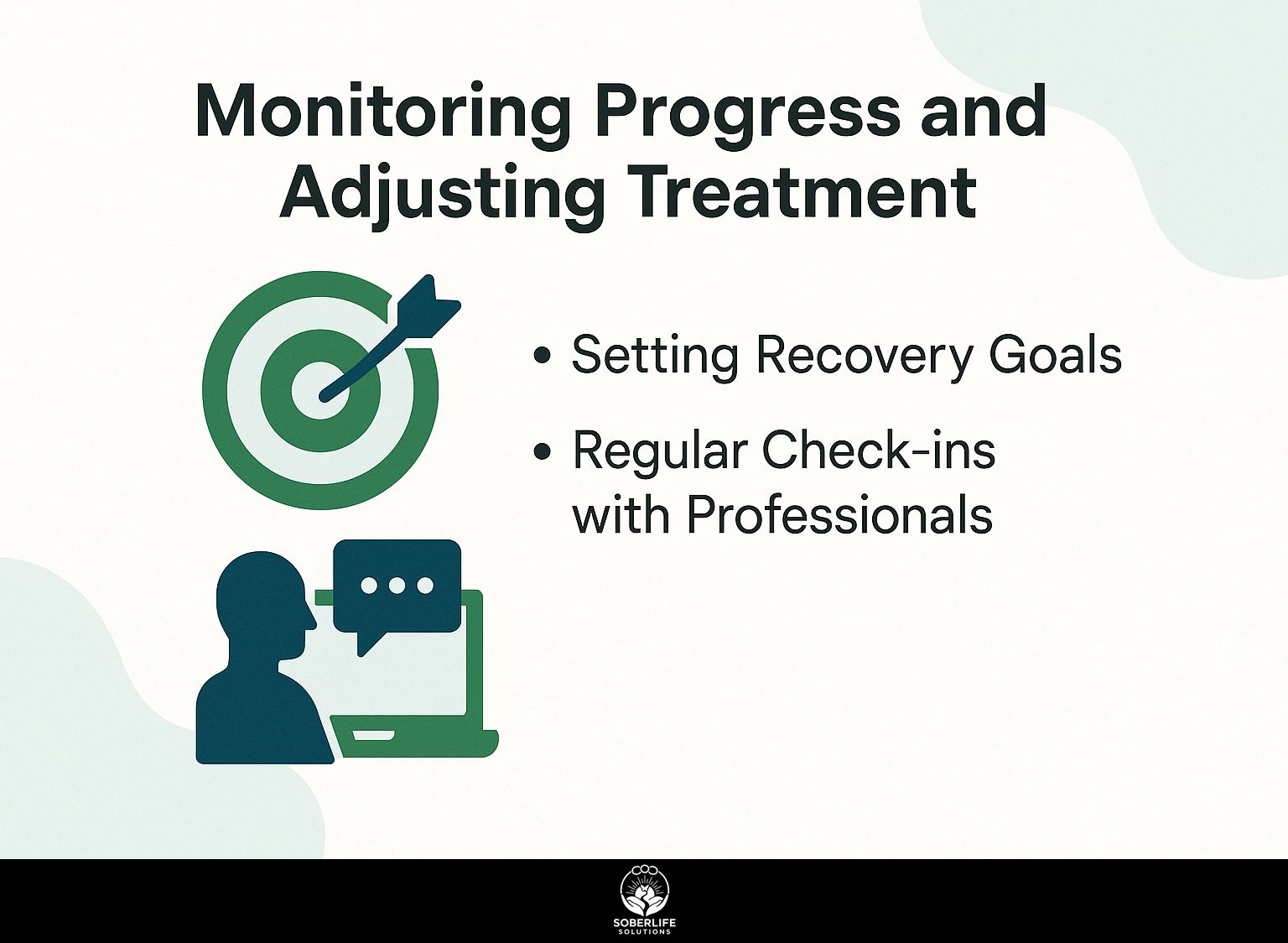
Regular check-ups and changes in treatment are needed for successful long-term recovery from AUD.
Setting Recovery Goals
Setting clear and measurable recovery goals helps people track their progress and stay motivated during their recovery.
To create effective recovery goals, try using the SMART method.
For example, a specific goal could be ‘attend three support meetings per week’ (Specific). Make it count: ‘I will write down how often I attend in a notebook’ (Measurable). Make it achievable by assessing your schedule: ‘I can manage this while balancing work’ (Achievable). Relevant to your recovery, state, ‘These meetings will help me connect with others in recovery’ (Relevant). Set a timeline: ‘I will maintain this for the next three months’ (Time-bound).
This structured approach clarifies your path to sobriety and emotional well-being.
Regular Check-ins with Professionals
Regular meetings with professionals are important for assessing how well treatments are working and changing recovery plans as needed.
To get the most out of these sessions, consider scheduling them every two weeks or monthly, depending on your needs. Talking openly is important; share any worries or changes in how you feel with your doctor.
For example, if you’re using a specific therapy, discuss its perceived benefits or side effects. Maintaining a symptom diary can help track your progress and facilitate meaningful conversations.
Changes might include changing medication amounts, trying different treatments, or experimenting with new methods to make sure your recovery plan suits your needs.
Frequently Asked Questions
What is AUD and how does it impact recovery and vigor?
AUD, or Alcohol Use Disorder, is a chronic brain disorder characterized by the inability to stop or control alcohol use despite negative consequences. It can greatly affect a person’s body, feelings, and mind, making it hard to stay healthy and energetic.
What strategies can be used to improve recovery in AUD treatment?
Some strategies that can help improve recovery in AUD treatment include building a strong support system, participating in therapy and counseling, practicing mindfulness and self-care, and adding healthy habits and routines.
How does exercise play a role in enhancing recovery and vigor in AUD treatment?
Regular exercise has been shown to improve mood, reduce stress and anxiety, and increase energy levels, all of which can be beneficial in promoting recovery and vigor in AUD treatment. It can also serve as a healthy outlet for coping with cravings and triggers.
What is the role of nutrition in improving recovery and vigor in AUD treatment?
Good nutrition is important for recovering from AUD. Eating a balanced diet can make you healthier, increase your energy, and help with mental health. Avoiding alcohol and incorporating whole, nutrient-dense foods can also aid in managing cravings and promoting overall wellness.
How can mindfulness and relaxation techniques be beneficial in AUD treatment?
Mindfulness and relaxation techniques, such as deep breathing, meditation, and yoga, can help individuals in AUD treatment manage stress, reduce anxiety, and improve overall well-being. These practices can also promote self-awareness and aid in managing triggers and cravings.
What are some ways to maintain recovery and vigor after completing AUD treatment?
Some ways to maintain recovery and vigor after completing AUD treatment include attending support groups, continuing therapy or counseling, staying physically active, practicing self-care, and avoiding triggers and situations that may lead to relapse. It is also important to have a solid relapse prevention plan in place.


